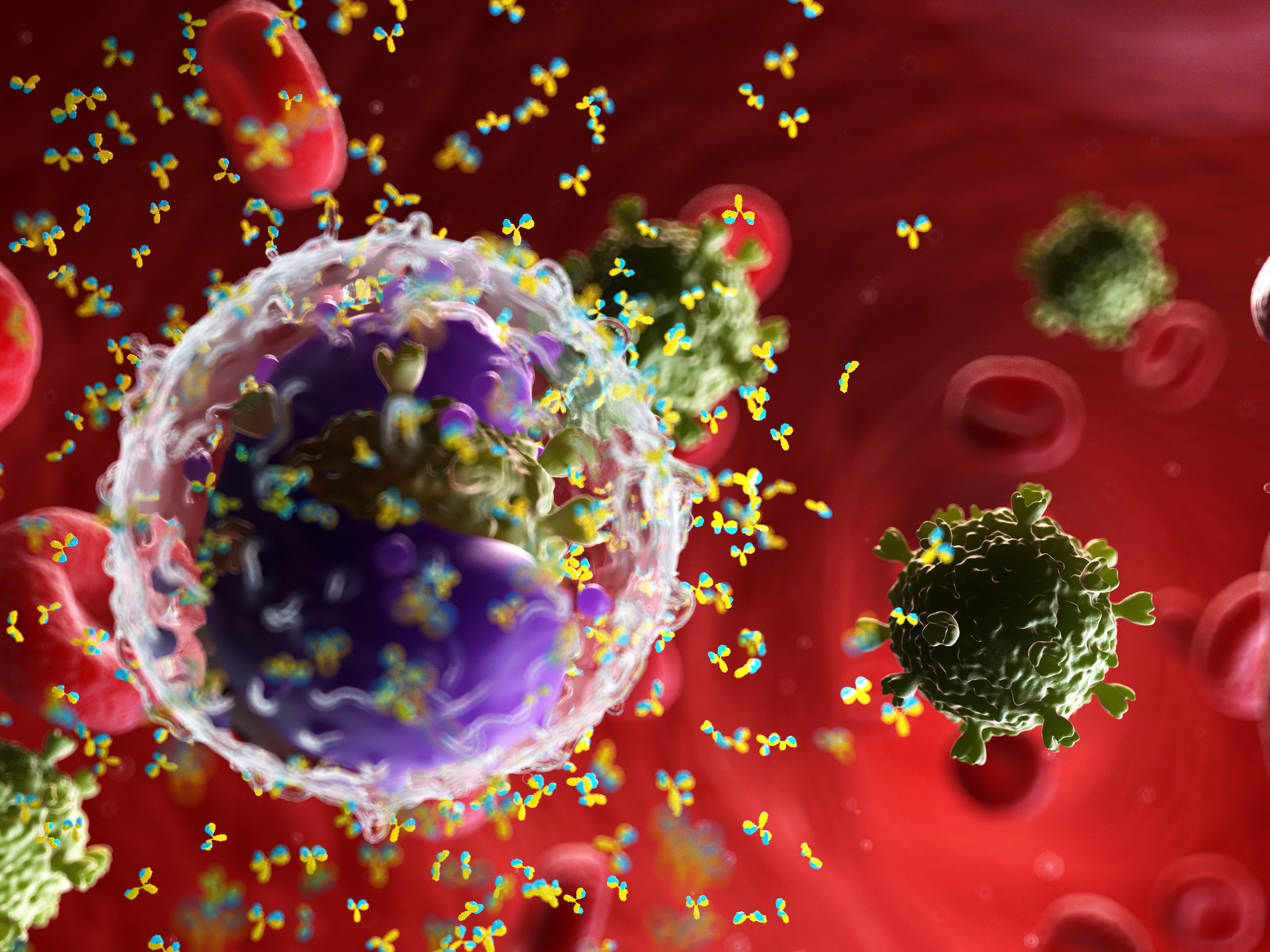
If you know whether a valuable product will continue to be readily available, you may need to do more than glance at retailer’s shelves or a distributor’s loading docks. You may want to examine a factory’s assembly lines. The desire to look all the way back to the start of a supply chain is what drove Washington School of Medicine scientists to study the production of SARS-CoV-2-targeting B cells.
Such cells are presumably proliferating and maturing at a good rate inside people who have received the Moderna and Pfizer mRNA vaccines. After all, in these people, infection rates have been reduced, and antibody levels appear to be high enough to provide at least six months of protection. But can we be sure that SARS-CoV-2-targeting B cells will keep entering the circulation?
To answer that question, the Washington School of Medicine’s Rachel M. Presti, MD, PhD, and Ali H. Ellebedy, PhD, essentially led an inspection of B-cell factories, which is to say, germinal centers (GCs). GCs are transient structures in the lymph nodes that generate affinity-matured B cells. Such B cells, despite their “factory” origin, are capable of a high degree of specialization. They give rise to plasma cells, which secrete antibodies that recognize specific infectious agents, and memory B cells, which linger in the body and “remember” how to fight a particular kind of infection, should it reoccur.
Presti, Ellebedy, and colleagues have found evidence that the immune response to mRNA vaccines is both strong and potentially long-lasting. Nearly four months after the first dose, people who received the Pfizer vaccine still had so-called GCs in their lymph nodes churning out immune cells directed against SARS-CoV-2.
“We found that GCs were still going strong 15 weeks after the vaccine’s first dose,” Ellebedy said. “We’re still monitoring the GCs, and they’re not declining; in some people, they’re still ongoing. This is truly remarkable.”
Detailed results appeared June 28 in Nature, in an article titled, “SARS-CoV-2 mRNA vaccines induce persistent human germinal centre responses.” The article describes how the scientists examined antigen-specific B-cell responses in peripheral blood and draining lymph nodes in 14 individuals who received two doses of the Pfizer vaccine, which encodes full-length SARS-CoV-2 spike gene. The article also details how the scientists examined fine needle aspirates of draining axillary lymph nodes to identify GC B cells that bound spike (S) protein in all participants sampled after primary immunization.
“Circulating IgG- and IgA-secreting plasmablasts targeting the S protein peaked one week after the second immunization then declined, becoming undetectable three weeks later,” the article’s authors reported. “These plasmablast responses preceded maximal levels of serum anti-S binding and neutralizing antibodies to an early circulating SARS-CoV-2 strain as well as emerging variants, especially in individuals previously infected with SARS-CoV-2, who produced the most robust serologic responses.”
“Remarkably, high frequencies of S-binding GC B cells and plasmablasts were sustained in these draining lymph nodes for at least 12 weeks after the booster immunization,” the authors continued. “S-binding GC B-cell-derived monoclonal antibodies predominantly targeted the receptor binding domain of the S protein, with fewer clones binding to the N-terminal domain or to epitopes shared with the S proteins of the human betacoronaviruses OC43 and HKU1. The latter cross-reactive B cell clones had higher levels of somatic hypermutation compared to those that only recognized SARS-CoV-2 S protein, suggesting a memory B cell origin.”
“This is evidence of a really robust immune response,” Presti said. “Your immune system uses GCs to perfect the antibodies so they can bind well and last as long as possible. The antibodies in the blood are the end result of the process, but the GC is where it is happening.”
Scientists don’t fully understand why some vaccines, such as the one for smallpox, induce strong protection that lasts a lifetime, while others, such as the vaccine for whooping cough, require regular boosters. But many suspect that the difference lies in the quality of the GCs induced by different vaccines.
In the current study, the Washington University team suggested that a better GC response may equal a better vaccine: “Our studies demonstrate that SARS-CoV-2 mRNA-based vaccination of humans induces a persistent GC B-cell response, enabling the generation of robust humoral immunity.”
In people without prior exposure to the virus, antibody levels rose slowly after the first dose and peaked one week after the second. People who previously had been infected already had antibodies in their blood before the first dose. Their levels shot up quickly after the first dose and peaked higher than the uninfected participants’ levels.
“We didn’t set out to compare the effectiveness of vaccination in people with and without a history of infection, but when we looked at the data we could see an effect,” said Washington University’s Jane O’Halloran, MD, PhD, one of the study’s co-first authors. “If you’ve already been infected and then you get vaccinated, you get a boost to your antibody levels. The vaccine clearly adds benefit, even in the context of prior infection, which is why we recommend that people who have had COVID-19 get the vaccine.”
"lasting" - Google News
June 30, 2021 at 01:30AM
https://ift.tt/2UMw801
COVID-19 Vaccines Induce Lasting Immunity via Sustained Germinal Center Responses - Genetic Engineering & Biotechnology News
"lasting" - Google News
https://ift.tt/2tpNDpA
Shoes Man Tutorial
Pos News Update
Meme Update
Korean Entertainment News
Japan News Update
Bagikan Berita Ini














0 Response to "COVID-19 Vaccines Induce Lasting Immunity via Sustained Germinal Center Responses - Genetic Engineering & Biotechnology News"
Post a Comment